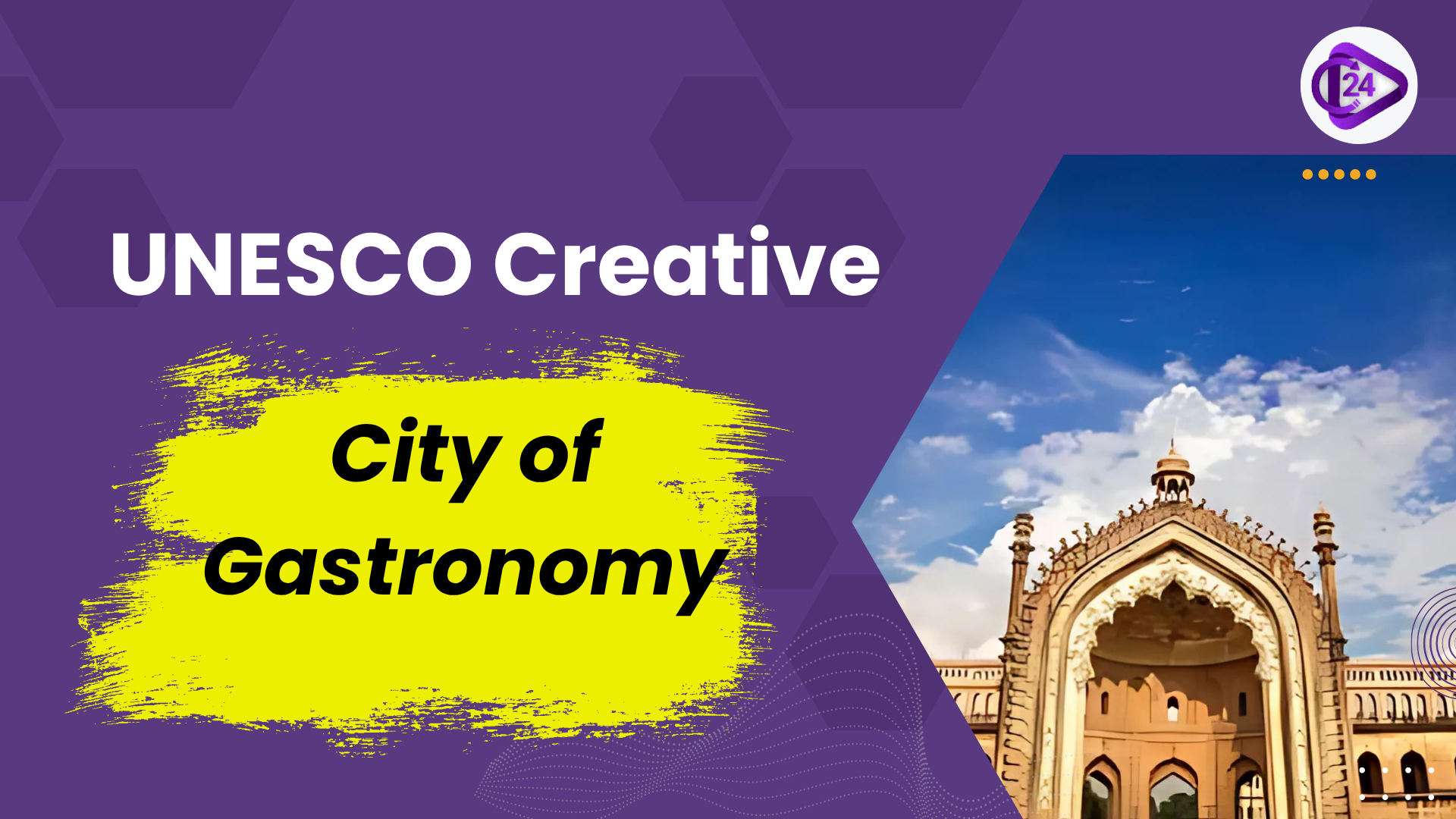
The capital of Uttar Pradesh, Lucknow, has been officially proposed by India to be a UNESCO Creative City of Gastronomy. This recognition aims to bring to light the Awadhi cuisine, which has always been a favourite among foodies in the region and around the world. This rich culinary tradition of Lucknow, whether it is the famous Tunday Kebabs and Kakori Kebabs or vegetarian food items such as Durga Ke Khaste and Bajpai Ki Puri, is a blend of courtly cuisine and home-style delicacies. The city's proposal for a Creative City of Gastronomy is an attempt to secure a UNESCO designation, similar to its Chikankari and Banarasi sarees.
Lucknow is a bid to be a UNESCO Creative City of Gastronomy, in recognition of its traditional Awadhi cuisine. The food culture in the city is a vital element of its culture, offering both vegetarian and non-vegetarian dishes.
Key Details Regarding Lucknow's Nomination
1. The UNESCO Creative City of Gastronomy Proposal
Awadhi Cuisine Highlighted:
-
Lucknow has submitted the proposal to UNESCO to be known as a Creative City of Gastronomy. The nomination dreads Awadhi cuisine, a vegetarian and non-vegetarian mix of delicacies that have been part of the city's cultural heritage.
Nomination Process:
-
The nomination process is being spearheaded by the culture and tourism department of the UP government, along with the assistance of Mumbai-based consultant Abha Narain Lambah, who compiled the detailed dossier that will be submitted to UNESCO.
2. Lucknow’s Rich Gastronomic Heritage
Delicious Non-Veg Specialities:
-
Lucknow is the place to savour Tunday Kebabs, Kakori Kebabs, Mutton Biryani and Chicken Kebabs, just to name a few items that would make your mouth water.
-
The royal kitchens of Awadh have a profound impact on the city's food culture, and there are specific recipes that have been passed down through generations.
Vegetarian Offerings:
-
Lucknow is also famous for its non-vegetarian dishes, along with vegetarian legends like Durga Ke Khaste, Bajpai ki Puri, khasta, and kachori.
-
The city is also inclined towards sweets. Motichur ke Laddu, Malai Paan and Imarti are some of the traditional sweets which are famous in the city.
3. Growing Global Recognition for Lucknow’s Culinary Scene
G20 and other High-Level Visits:
-
The recent G20 Summit, DefExpo, and UP Investors Summit have added an international dimension to the city, as well as another focus on its culinary tradition. Foreigners have sampled the sumptuous food in Lucknow, and this is the boost this city needed in its quest to win the UNESCO status.
Tourism Impact:
-
Lucknow is already an established tourism destination, with 480 million tourists visiting the city every year, many of whom come to the city's food courts to relish the variety of local delicacies.
4. Cultural Significance of Lucknow’s Cuisine
Blending of the Past and the Present:
-
As Abha Narain Lambah writes about the cuisine of Lucknow, it is not just a repository of traditional Awadhi cuisine. Still, it is also evolving and progressive, accommodating new tastes and preferences. Such fineness and diversity have established Lucknow as a culinary destination for people worldwide.
Culinary Evolution:
-
The food scene in Lucknow is constantly evolving, with the abundance of traditional food being combined with the ever-changing flavours of contemporary food culture. The fact that the city has managed to strike the right balance between tradition and innovation in terms of what it offers in terms of food also makes it deserving of UNESCO status.
5. Next Steps for the Nomination
Final Data Submission:
The application of Lucknow as the Creative City of Gastronomy is going to be re-examined, and a final round of data is to be provided by the end of June. After that, UNESCO representatives may arrive in the city to investigate the statements and assess the food heritage.
Focus on Awadhi Cuisine’s Global Impact:
-
The city's food proposal focuses on the rich food culture of Lucknow and its potential contribution to the world's food culture, with the epicentre of this gastronomic movement being Awadhi cuisine.
Indian Cuisine Origins and Evolution:
-
Indian cuisine reflects a 5000-year history of cultural and community influences.
-
The spice trade with Europe was crucial to the Age of Discovery, making Indian spices highly sought after globally.
-
Early cuisine involved simple food habits of the Aryans, later becoming more complex with agricultural advancements.
-
Vegetarianism emerged due to religious influences like Buddhism and Jainism.
Foreign Influences on Indian Cuisine:
-
Greek, Roman, and Arab traders brought essential spices such as saffron, cumin, and coriander.
-
Arabs introduced coffee, and Persian Zoroastrians influenced the development of Parsi cuisine, including the introduction of biryani.
-
The Mughals revolutionized food with Mughlai cuisine, introducing dry fruits and nuts.
-
The Portuguese introduced tomatoes, potatoes, sugar, and refined sugar.
-
British colonial influence led to tea culture and the use of knives and forks.
The Role of Spices and Herbs:
-
Spices are integral to Indian cuisine, with 'masala' being a blend of various herbs, such as garam masala.
-
Ancient Ayurvedic texts highlight the medicinal properties of spices.
-
Indian spices were traded globally, influencing the cultures of many nations.
Regional Cuisines in India:
-
North India: Known for Mughlai cuisine, which includes rich dishes like kebabs, kormas, and biryanis, and the use of wheat-based breads like naan and roti.
-
South India: Focuses on griddled foods like dosas, sambars, and seafood, with heavy use of tamarind, coconut, and 'kari' leaves.
-
East India: Bengali cuisine emphasises fish, mustard oil, and subtle flavours; Oriya cuisine is known for its delicate spices and seafood.
-
West India: Includes diverse cuisines such as Rajasthani, Gujarati, and Goan, with influences from hunting, vegetarianism, and Portuguese rule.
Festivals and Traditional Foods:
-
India celebrates numerous festivals with special dishes offered to deities, such as Modakas during Ganesh Chaturthi or milk pudding during Janmashtami.
Indian Food Around the World:
-
Indian food, especially curry, tandoori dishes like chicken tikka, and biryani, is popular worldwide.
Indian cuisine has had a significant influence on the cuisines of Southeast Asia, Malaysia, Singapore, and the Middle East. -
Indian food's global presence, exemplified by dishes like Chicken Tikka Masala in the UK, highlights its widespread popularity.
Conclusion
The nomination of Lucknow as a UNESCO Creative City of Gastronomy highlights the abundance of Awadhi cuisine and its rich food culture. As its profile grows internationally, thanks to the presence of a substantial tourism industry and high-profile visits and connections with the outside world, Lucknow is seeking to be ranked among other world cities which are known for their culinary arts. The city's bid to win this coveted title underscores how food culture, heritage, and contemporary tourism converge to give the town a stronger sense of place in the global arena.



 Maldives Becomes First Nation to Enforce Generational Smoking Ban
Maldives Becomes First Nation to Enforce Generational Smoking Ban Trump Honored with South Korea’s Grand Order of Mugunghwa
Trump Honored with South Korea’s Grand Order of Mugunghwa Russia Stuns the World with Successful Burevestnik Nuclear Missile Test, Confirms Putin
Russia Stuns the World with Successful Burevestnik Nuclear Missile Test, Confirms Putin NASA Confirms Earth Now Has a Temporary Second Moon Named 2025 PN7
NASA Confirms Earth Now Has a Temporary Second Moon Named 2025 PN7 Timor-Leste Officially Becomes ASEAN’s 11th Member Nation
Timor-Leste Officially Becomes ASEAN’s 11th Member Nation Rodrigo Paz Elected Bolivia’s President: A New Era Begins
Rodrigo Paz Elected Bolivia’s President: A New Era Begins Astronomers Discover Evolving Ring System Around Icy Body Chiron Beyond Saturn
Astronomers Discover Evolving Ring System Around Icy Body Chiron Beyond Saturn Sundarbans Aquaculture Model Wins FAO Global Recognition for Sustainability
Sundarbans Aquaculture Model Wins FAO Global Recognition for Sustainability Maldives Achieves Landmark Success in Protecting Newborns from HIV, Hepatitis B, and Syphilis
Maldives Achieves Landmark Success in Protecting Newborns from HIV, Hepatitis B, and Syphilis UN Human Rights Council Elections: India Wins Membership for 2026–2028
UN Human Rights Council Elections: India Wins Membership for 2026–2028






